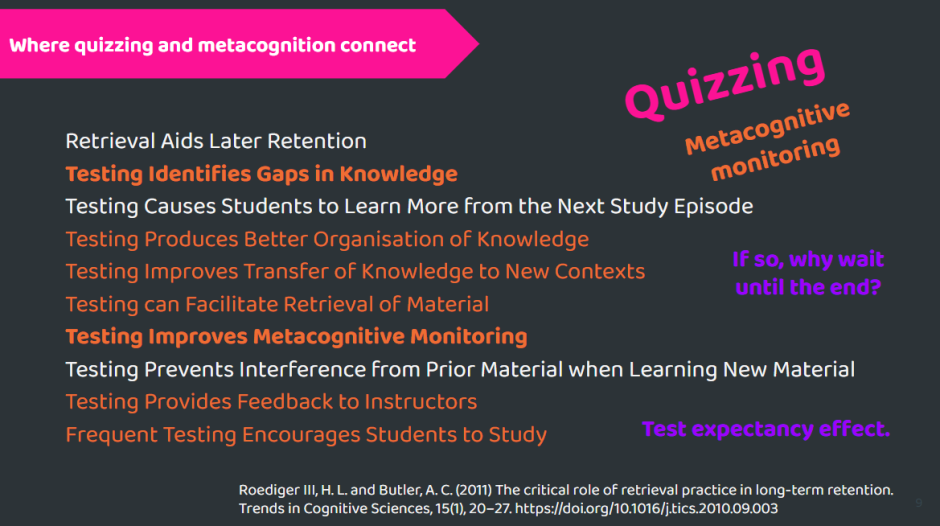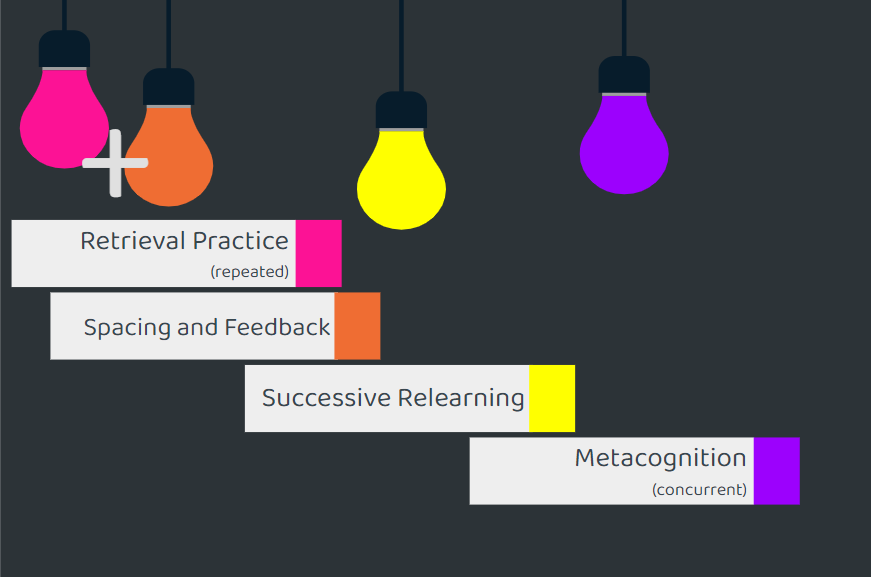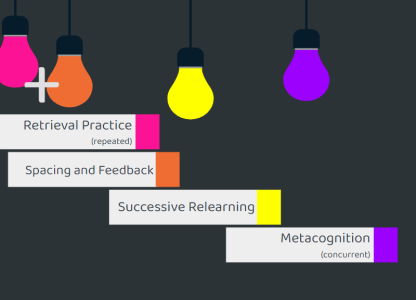Today, I was at the Sec-Ed conference – Metacognition: Practical strategies for your classroom. It kicked off with Kirsten Mould @kirsten_mould from the EFF, Jackie Beere beamed in with the afternoon Keynote from Matt Bromley @mj_bromley – who was an absolutely pleasure to meet.
What brought me to the big smoke?
Metacognition is a key ingredient of test enhanced learning. It connects directly (bold) or indirectly with 7 of 10 key benefits of retrieval practice in long-term memory highlighted by Roediger et al. (2011). Add to that, my interest in successive relearning, the fascinating research into the illusions of competence and self-regulation.

Today’s event
Metacognition, the most searched term on the EEF website, offers schools ‘high impact for low costs.’ It has ‘impactivity,’ @gwynap (borrowed from ERRR podcast) and much more than the ‘thinking about thinking’ or ‘learning about learning,’ parody, implying it is a skill out there on its own, as Kirsten shared, these are ‘all a bit vague.’
So what is it?
Metacognitive knowledge of task, of strategies, of self. Monitoring regulations of planning, monitoring and regulation.
It’s hidden but it is everywhere.
@kirsten_mould

I would suggest that before knowledge and contributing to it, is beliefs (including knowledge and perceptions), preceding planning, monitoring and evaluation, and concluding with control. If this addition sparks interest, see Rivers (2021).
Ultimately, in classrooms, it is the relinquishing of control from the teacher to the pupils. From activating prior knowledge, explicit instructions, modelling, memorisation (checking for understanding may be more palatable), guided practice, SLOP or independent practice, through to structured reflection. Cue conversations on the power of routines and ‘valleys of disappointment,’ exams wrappers and more.
Concurrent metacognition possibly a valuable area of research not explicitly spot-lighted by the EFF’s ‘Seven-step model.’ Well worth your professional reading time.
Jackie Beere beamed in…
Talked about recognising behaviour as a choice. Choosing PQs – “positive quotient” over the saboteur, developing your ‘mental fitness’. Why is it, as we grow up, we find this more difficult?
Jackie shared some metacognitive magic classroom practice ideas, metacognitive questions, learning journals, coaching partners, meta-mantras ‘Glad to be me,’ mindfulness breathing (preferably nasal breathing), challenge comfort zones (traffic lights), and review, recall and RESPONSE – (a three Rs?).
To constantly get pupils to be curious about the learning and surf the wave of challenge.
Laura March talks metacognitive model
Fisher and Frey (2008), EEF Metacognitive Review (2021) and Rosenshine (2012).
A model describes principles and practices that can be shared across disciplines, promote cross curricular conversations using a common vocabulary.
Modelling, externalising thinking, platforms for discussion, dialogic talk and time for independent work – all important.
The use of metacognitive questions can be gradually increased and then removed as the intellectual weight shifts from the teachers to the pupils.
Desirable difficulties* gets a mention as does the conflation progress vs performance fog. The later taken over to the lesson drop in proforma. Here two view points are considered. What does the teacher? What do the pupil do?
Helen Webb shares Metacognitive Approaches in the classroom
Why? How? How not? Instructions for teaching guides classroom expectations and routine adoption.
Helen shared some whiteboard extra’s, I really liked the use of “Wobbly your boards if…”
Wobbly your white boards if your answer includes the word ‘reaction.’
Helen Webb
Metacognitive strategies are not just for the pupils. Helen shared how these same metacognitive strategies, ‘in ‘my’ classroom’ thinking can help teacher planning and thinking metacognitively in advance of their teaching. In advance, not just reflectively. Most interesting, these same questions can then become excellent prompts when teaching. For example:
“What misconceptions might pupils bring to this task?” then becomes “You might be thinking X – let’s not fall into that thinking, rather…”
Now – I did not get to jot down my thoughts of Matt’s excellent session as I was reducing my afternoon seminar- what I can say is, I hope to continue our conversation and to hear him speak again sometime soon. It was not only what he said, but the conviction with which he shared it. Do cross paths with Matt Bromley if you get the opportunity (About-matt-bromley/).
Too arms colleagues.
And lastly, why in person events matter

Fisher, D. & Frey, N. (2008). Better Learning Through Structured Teaching: A framework for the gradual release of responsibility. ASCD.
M. L. Rivers, Metacognition about practice testing: a review of learners’ beliefs, monitoring, and control of test-enhanced learning. Educational Psychology Review, 33(3) (2021), 823–862.
My table colleague shared ‘Pinpoint’ (individually target questions for maths post assessment). One to review.



